Displaying items by tag: Peter Malone's Movie Reviews
The Life and Deaths of Christopher Lee
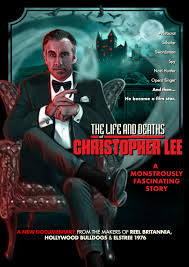
THE OF LIFE AND DEATHS OF CHRISTOPHER LEE
UK, 2024, 90 minutes, Colour.
Directed by Jon Spira.
Christopher Lee was always an imposing presence on screen whether in supporting roles or in leading roles, making his dramatic presence felt in Hammer Studios productions, Dracula in 1958, although, it is noted, appearing for only eight minutes in the film).
This is an opportunity for the public but, especially, for film buffs and enthusiasts to learn something of the life of Christopher Lee – and, as mentioned frequently, the range of deaths he suffered on screen.
The writer and director of the film is Jon Spira, who made a number of film documentaries including Hollywood Bulldogs, The Rise and Fall of the Great British Stuntmen as well as a look at Elstree 76.
The film uses the device of having an actor, Peter Serafinowicz, voice Christopher Lee telling his own story. And, visually, the striking device of having a puppet, marionette, on strings, looking like Christopher Lee and narrating the story.
There is ample background on Lee’s lineage, from the Middle Ages, Italian aristocracy, marrying into British military backgrounds, his education, possibilities, art, acting, difficulties with his being too tall, looking to Italianate, small parts in the emerging British industry of the 1940s and 1950s. And all this is told with sardonic remarks, Lee’s own perspective.
The film traces his career, the small parts, illustrated with quite a number of clips, the history of Hammer Studios, Dracula, the reputation with Dracula films, his strong friendship with Peter Cushing through many films, again genial clips, especially at the end of Peter Cushing’s life when the two were filming dialogue for a documentary, a fine tribute to Peter Cushing.
There are quite a number of directors who were friendly with Christopher Lee and happy to give testimony, especially a laughing an exuberant John Landis, Joe Dante, significant interview material from Christopher Lee’s niece, the actress Harriet Walter and one of his sons-in-law, with friends, who later produced the records, Charlemagne and the rock music and songs by Lee himself.
There is a background of his marriage, not to the fore, but then the various stages of his career – especially his time in Spain with a range of horror films, then his years in the United States, quite a surprise to watch the clips and the range of films that he appeared in, then the 1990s, return to England, once again a number of roles but building up to his presence, and interview material with Peter Jackson, and his appearance in The Lord of the Rings.
Some of the commentators indicate that Lee, despite his strong height and appearance, was often hesitant, lacking in confidence. But, he enjoyed being in the limelight and audience response. And, he was finally knighted given lifetime awards, dying the age of 92.
The documentary moves along rapidly, gives the audience a good overview of the life of Christopher Lee, the backup of the interviews, and the satisfaction of seeing such a wide number of clips of his films – and the memories of his being Dracula and his final disdain of an interviewer referring to him as the King of horror.
Teilhard: Visionary Scientist
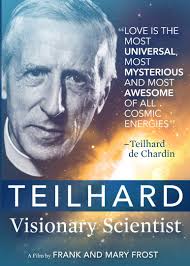
TEILHARD – VISIONARY - SCIENTIST
US, 2024, 117 minutes, Colour.
Directed by Frank and Mary Frost.
“God does not make the world. God makes the world make itself without God’s interference.”
Is that our idea of God, of the cosmos, of evolution? In the past, not so much agreement but, in more recent decades, a more visionary perspective on science and on religion.
The author of the quotation is the Jesuit scientist Teilhard de Chardin (1881-1955). For those who want to know who Teilhard was, how we came to his insights and conclusions, what it was like to be a prophet (not always welcome in his own country), what it was like to be enthralled by the cosmos, to be a visionary (sometimes hailed, sometimes ridiculed and denounced), then here is an exhilarating two hours to introduce Teilhard or to become re-acquainted with Teilhard de Chardin, to become aware that we live in Le Milieu Divin (no need for translation).
This documentary by Frank and Mary Frost has been, literally, years in the making. As for so much from its long production (no matter how demanding for the filmmakers and their supporters). Travel to actual locations, tracking down photos and footage, lining up interviews and commentary. The visuals of the film are often magnificent, so much location photography – France for Teilhard’s early life and teaching career in Paris, England for his religious studies, China for his archaeological ventures, the US where he was “exiled” and where he died. Quite a range of locations which help bring Teilhard’s life to life.
The footage, as expected, includes many photos but also news and home film, which means that Teilhard is not just a character of books and articles but we see him as a person, joys and sorrows.
And, also as expected, quite a range of interviewees, many Jesuits as is fitting, scientists, museum curators…
In a way, one could say that Teilhard lived too early, a late 19th century figure soon after Darwin, in the spirit of the archaeological diggings of the early 20th century. And his early years as a Jesuit and as a priest in the time of church leadership and campaigns and strictures against “Modernism”. Teilhard and his creative writings, science, religion, spirituality, mysticism, led to some 20th century inquisitorial behaviour by those who were wary, sometimes shocked. And there were health and depression consequences for the targets.
A significant feature of Teilhard’s life, hands-on rather than philosophical/theological, was his four years as a stretcher bearer in World War I when he was in his mid-30s, surviving although some of his family did not. In many ways, war and archaeology, his life was down-to-earth.
But, back to the themes. First, some quotes:
Earth is throbbing with divine energy.
Matter is infused by spirit.
The traditional “Great Chain of Being” is a process, dynamic.
Teilhard died seven years before the opening of the Second Vatican Council and the greater opening up of Catholic thought from the 1960s which meant a greater awareness of what Teilhard wrote, its being more widely appreciated and accepted – and, as this film shows, still an inspiration for our times.
Oleg: the Oleg Vidov Story
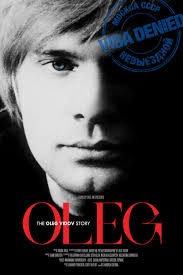
OLEG: THE OLEG VIDOV STORY
US, 2022, 90 minutes, Colour.
Narration by Brian Cox.
Directed by Nadia Tass.
Most audiences will initially ask who is Oleg? Who is Oleg Vidov? It will certainly enjoy the 90 minutes of answer here.
There are three strands of Oleg’s story intertwined, his cinema history, the experiences of life in the Soviet Union, the dimensions of his personal life.
For cinema buffs, his cinema history will be something of a treat. He began to get screen roles in his early 20s, in the 1960s, quickly becoming popular because of his screen presence, the variety of roles, good-looking, dubbed the Russian Robert Redford. Magazine articles, fans… What is particularly interesting is the range of clips from the Russian films of the 60s and 70s, unfamiliar to Western audiences, something of a revolution in their themes and style. And, throughout, there are interviews with a range of Russian directors as well as actors and actresses.
While there was success, there was the ideology of the use of film, dating from Lenin and his enthusiasm, propaganda for the Soviet Union, instruction for the audiences in socialism. Somewhat stifling for the creative film community.
Another interesting aspect is the beginning of international collaboration, Oleg’s scouted for a Danish film, The Red Mantle, his first trip abroad, its openness a bit of a shock to his Russian colleagues. More acceptable was filming in Tito’s Yugoslavia in 1967, working with stars like you will bring and Orson Welles, the Battle of Neretva. There are also glimpses of 1970s Waterloo with Rod Steiger and Oleg portraying an English soldier.
After his moving to the United States, he appeared in a number of films, this documentary inserting a clip from Red Heat, co-starring with Arnold Schwarzenegger, then his playing the role of the Russian Undersecretary of the United Nations in the missiles of October drama, with Kevin Costner, 13 Days.
One of his substantial contributions to cinema culture was his getting the rights to a wide range of Russian animation from the past, some of the films that he grew up with. With his wife, Joan Borsten, he persuaded celebrities like Mikael Baryshnikov to support their restoration, dubbing (with stars like Bill Murray and Charlton Heston), their being shown on television. However, a Russian company, taking the name of the previous company, sued for the rights to these films, difficult times in courts, appeals, but judgement finally on the side of Oleg and his wife.
Those of a more historical/sociological frame of mind will be interested in Russia, Oleg’s first decade, born in 1943, was under the dictatorship of Stalin, pressured atmosphere, especially after the end of the war, the Iron Curtain, the cutting off of Russians from the rest of the world, the arts heavily censored, depending on Stalin’s approval, a flourishing film industry but at the service of the state. Oleg’s early years of cinema were of the Kruschev era but, then in the return to repressive government by Brezhnev. As indicated, Oleg experienced repression leading to his escaping, defecting, and finding his way to the United States.
There is also then, underlying everything, Oleg’s personal life. There was his dependence on his mother, staunchly Communist, responsible jobs which included travel, including to China and Mongolia, Oleg having to live with his aunt in Khazakstahn. There is a return to Russia, poor, his mother’s mental collapse, taking him to see the movies, kindling the ambition to be an actor, some difficulties in getting into the school, work, final acceptance, and the beginning of his career and quick move to popularity. (And the information that many of the popular films, including American, were confiscated from Goebbels’ collection in Berlin.)
He encountered Brezhnev’s daughter and her close friend, an actress,fell in love with her, eventually getting permission to marry, their having a child, the Brezhnev influence and getting them a more upmarket apartment. But his wife was used to having every comfort and made continuous demands on her husband, eventually a divorce being arranged behind his back. With his experience of working in Yugoslavia and the law allowing married couples to live in different parts of the Soviet Union and Communist countries, he went through an arranged marriage and moved to Yugoslavia. With the urging of a co-star who could move comfortably between Yugoslavia and Austria, getting his passport, he escaped (a comic scene where the border guards are watching a football match and just as a goal was scored, their being waved through).
He was very successful in America, many articles about him, television interviews, some film roles, and encouraged by the director of Red Heat, Walter Hill, some film roles. However, he encountered and was helped by the daughter of a critic, a journalist, Joan Borsten. They married in 1989, happy life, charity work, and the promotion of Russian animation as mentioned previously.
Home movies of his final years, happy marriage, life in California, his final cancer – but, the unexpected joy of making contact with his son who moved to the United States and then, the discovery of another son from a liaison he had had in the 1970s.
The film was directed by Nadia Tass, celebrated Australian director (Malcolm, Amy). She was personally selected for the direction by Joan Borsten herself.
Feud: Capote vs The Swans
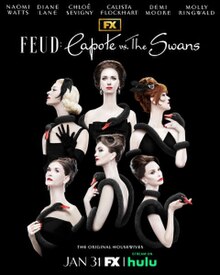
FEUD: CAPOTE VS THE SWANS
US, 2024, 8 x 60 minutes, Colour.
Tom Hollander, Naomi Watts, Diane Lane, Chloe Sevigny, Calista Flockhart, Demi Moore, Molly Ringwald, Treat Williams, Joe Mantello, Russell Tovey, Jessica Lange, Chris Chalk.
Directed by Gus van Sant, Jennifer Lynch, Max Winkler.
As the second in the television series of Feud, created by Ryan Murphy (also creator of American Horror Stories and Glee). The first feud was between Bette Davis and Joan Crawford during the filming of Whatever Happened to Baby Jane.
Response to this series will depend on audience sympathy or not with its central character, author Truman Capote (previously played by Philip Seymour Hoffman in his Oscar-winning role in Capote as well as by British actor Toby Jones in Infamous). Capote, from the south, found fame with Breakfast at Tiffany’s and then his research for and publication of In Cold Blood. However, effeminate in style, camp, openly gay, he found acceptance in affluent New York society, especially with a group of women in the 1960s whom he dubbed The Swans. However, he wrote fictitious articles about them, but their being quickly recognised, they turned on him.
Response to the series will also depend on audience attitudes towards the Swans, the self-centred way of life, their arrogance, social ambitions – and the vengeance on capacity.
The series has a very strong group of directors as well as acting cast. Tom Hollander is completely convincing as Truman Capote – and a bonus is the presence of Jessica Lange in memories and dreams of his mother.
For some perspective on the characters and moral issues, the fifth episode is interesting in a created meeting between Capote and author James Baldwin, his encouraging Capote but their discussing and analysing his relationship with The Swans and his writing.
The central characters are all real but this is an interpretation of them – and, to the anger of some reviewers, it is a hostile/critical interpretation of Capote.
- The series on American Feuds?
- Audience knowledge of Truman Capote? American society in the 1950s to the 1970s? Interest/not?
- Truman Capote in himself, his life, his writings, success, reputation, vanity, gay orientation, love of society, the expose, vengeance wreaked on him, the impact of his mother, the meaning of his life?
- The impact of the series, eight episodes, the range of writers, directors? The prestigious cast?
- The episodes, moving around in time, flashbacks to Capote his childhood and relationship with his mother, as emerging in the 1950s, Breakfast at Tiffany’s, the 1960s, the research for writing In Cold Blood? His status? Yet his personal ambitions, the 1960s, society, friendships, his writing, the publication of the article, condemning the swans, reactions? His researching his reply, Answered Prayers? His drinking, drugs, health, relationships? Into the 1980s, his collapse, death?
- The significance of the fifth episode, the conversation with James Baldwin, his character and career and writing in the light of this conversation, James Baldwin and his reputation, literature, living abroad, homosexuality? Discussing the situation with The Swans? An opportunity for moral evaluation of the themes and characters?
- The attitude to New York society, wealthy, snobbery, status, moral perspectives, sexuality and relationships, betrayals, the impact of wealth, to be seen, restaurants, balls? Wealthy American New York society of the period? Households, mansions, lifestyle, fashion, beauty parlours and manicure is, servants…?
- The portrayal of The Swans? Babe Paley and her relationship with Bill, his fears, his impact on the world of television, her patience with him, yet her coldness towards her children and alienation? The 1950s and 60s, Capote entering into this world, Bill Paley’s reaction? The cells next? Babe and her devotion to Capote, his devotion to her? Slick, haughty, her marriages and flaunting her husbands, vindictive attitudes? Gossip, the Royal family, international status? C.Z., her lifestyle, gardens, horses, posing nude for Frida Kahlo, the painting, her friendship with Capote, Brinkley to him, mediating? Lee Radziwill, her relationship with her sister, Jackie Kennedy, her place in society, interactions with Capote? Not supporting him?
- Ann Woodward, her story, relationship with her husband, the shooting, her confronting Capote, the reaction of The Swans? His writing about her, her suicide? Her family coming later to haunt him?
- The episode of the Black and White ball, the discussions, the guest of honour, the irony of the editor of the Washington Post, The Swans vying with each other, the visuals of the ball?
- The Maysles Brothers? Their skills documentarians? The filming of the documentary on Capote in his life, in black and white, the presence of Albert Maysels’, devotion, dancing together? The effect of the film?
- The bonds between the women, ladies who lunch, Capote and his entree into their world, friendship with Paley, Paley turning against him? Capote exploiting his friendships?
- His writing, turning against the women, the visualising, the recognising themselves? The articles, widely read? The effect? The reaction of each of The Swans?
- Capote, the baths, the encounter with John, the relationship, John and his moodiness, leaving his family, some violence towards Capote it? The irony of his daughter, her coming to Capote, his taking her on, as a project, as a model, the incident of her being bottled on babe Paley, Richard Avedon in the photo at his change?
- Jack, the long relationship, his moving to Switzerland, his companions, trying to give advice to Capote?
- The background of his feud with Gore Vidal?
- Capote, the drinking, the intoxication of his connections, status in society, drugtaking, as range of partners and young men? Change of heart on not? The writing of Answered Prayers? Series dramatising the scenes from answered Prayers, the different light on The Swans?
- Babe, arrogant, yet sympathetic, her husband, illness, revealing it, her death? Her grave?
- The importance of his mother, her appearance in his fantasies, the reminiscence about the past, his bringing up, her influence, her being a prima donna?
- His later years, Johnny Carson’s former wife, care for Capote, his death?
- Audience response to the series, curiosity, prurience, revulsion, interest, judgement?
Perfection, The

THE PERFECTION
This, 2019, 90 minutes, Colour.
Alison Williams, Logan Browning, Steven Webber, Alaina Hoffman.
Directed by Richard Shepard.
By the end of The Perfection, the audience knows that it is been through quite an ordeal with the two central characters. And not in any anticipated way.
Interest in the film will depend on identification or not with these two central characters, Charlotte, Alison Williams, a talented cello player, her training interrupted by her having to look after your mother for 10 years, Lizzie, Logan Browning, a talented cello player who has had a successful career. After her mother’s death, Charlotte makes contact again and meet patrons and teachers at a recital in Shanghai where Lizzie is to be a judge of a competition. The film sets up the relation between the two.
There are glimpses of the Chinese countryside as the two go on an economy bus ride, Lizzie becoming very ill, Charlotte caring for her, this is linked with an outbreak in China (the film coming out a year before Covid!), leading to drastic action to help Lizzie.
Then quite an unexpected twist, a rewind, a different interpretation as to what happened.
Then, back in Boston, Lizzie made unwelcome because of her being unable to play the cello, Lizzie deciding to wreak revenge on Charlotte and abducting her and bringing her to Boston. Then, another rewind and different interpretation.
Which leads to something of Grande Guignol, Gothic horror ending.
The screenplay certainly keeps the attention with its twists, the experiences of the characters, revelations at the end, and the condemnation of exploitation of vulnerable children.
- Psychological drama, becoming a horror drama?
- The world of music, the Institute in Boston, the heritage from the 1920s, cello? The students, the staff, Anton presiding, his kingdom, his ancestors? The return after Shanghai, inside the building, more sinister?
- The musical score, the performances, the cello?
- The introduction to Charlotte, the close-up of her dead mother, her sitting in the chair, indications of memory, attempted suicide, the institution? 10 years of care for her mother? The flashbacks to leaving the cello Institute, the sighting of Lizzie on the stairs? The aftermath of her mother’s death? Reaching out to Anton and Paloma?
- Shanghai, the vistas of the city, atmosphere, the competition, performances, socials? Anton presiding? Welcoming Charlotte? The young girls, the scholarship, Lizzie as judge, meeting Charlotte, her admiration, Charlotte’s devotion to Lizzie and her career? Charlotte as judge? The gossip during the recital, the parents and the affair, giggling, the celebration, dancing, the mention of the disease in China, the man collapsing?
- The attraction between the two, the sexual encounter, the aftermath? With Lizzie inviting Charlotte to go on the holiday? The hangover? The medication? The rough bus, Lizzie unwell, determined to go, the journey, being sick, the appeal to the bus driver, his refusal, the helpful young man, the passengers giving the water? Out of the bus, continuing the journey, ousted? The walk to the town, Lizzie, unwell, the vomiting, the bugs, the manifestations on her arm, Charlotte offering the cleaver, her cutting off her arm?
- After horror aspects, the rewind, the different interpretation, Charlotte and the hallucination medication, supporting Lizzie but actually making her worse, speculation about Charlotte and her motivation?
- Lizzie, the return to the Institute, the amputated hand? Anton and Paloma, rejecting her? Her motivation, revenge, going to Minnesota, the confrontation with Charlotte, abducting her, taking her to the Institute, in the car boot? Anton and his response, Charlotte and jealousy? Her being tied up, too close a piece, her not being allowed to make a mistake, otherwise punishment?
- The next generation, the Chinese girl, her mother, shone around, the hopes and promises?
- The revelation about Anton, the two men on the staff, Paloma, the use of sexual abuse, punishments, the flashbacks?
- The rewind, Charlotte and her motivation to bring Lizzie to her senses, acknowledge the truth, their planning together, poisoning the two men, stabbing Paloma, confronting Anton?
- The brutality of the stabbing and hacking attack on Anton?
- The finale, the two playing the cello, Anton mutilated, retribution?
Northern Comfort
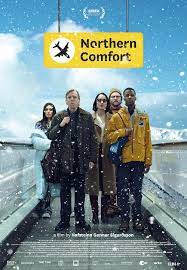
NORTHERN COMFORT
Iceland/UK, 2023, 97 minutes, Colour.
Lydia Leonard, Timothy Spall, Simon Manyonda, Ella Rumpf, Nick Blakely, Gina Bramhill, Rob Delaney, Emun Elliot, Sverrir Gudnasson.
Directed by Hafsteinn Gunnar Sigurdssobn.
Northern Comfort is a film from Iceland, director, actors – but, a collaboration with the United Kingdom, especially for the cast.
At the core of this film, comic touches, serious themes, is the fear of flying. Which means the title is ironic.
The film opens with a test run, a group of fearful clients, hearty instructions by the staff, experiencing a simulation, relieved when it is over. Then, the training company offering a short flight in reality to test their overcoming of their fears. We are introduced to several characters to bring the drama to life, Lydia Leonard as Sarah, a competent businesswoman, pretending that she has had flights to Los Angeles when she has simply been at home, in a relationship with a man and his daughter. Timothy Spall is a military veteran but a popular writer. There is the influencer, Cocoa, Ella Rumpf, with her boyfriend, IT inventoSverrir Gudnasson. And there is the leader, having to take more responsibilities than usual, Charlie, Simon Manyonda.
As might be expected, the actual flight has all kinds of problems exacerbating the fear of flying. Then, they are stranded in Iceland, the plane needing repairs, put up at a hotel, the attempts to get away, Sarah encounters a drunken taxi driver and crash, Edward using military tactics to intimidate Charlie, the inventor encountering someone at a bar and discovering his sexual orientation. And Sarah is desperately trying to ring her boyfriend who is angry because he saw her embraced by Charlie, encouraging her misinterpreting it.
The way out, in fact, is a flight to Germany, overcoming some fears, getting home, confessing the truth, safe back on home ground.
- The title and its irony is? Fear of flying? Nervous passengers? Test flights? Reality?
- Iceland/UK collaboration? British perspectives? Nordic perspectives?
- The British locations, the characters and their situations? The flights? The Iceland locations, visuals, the countryside, hotels? Musical score?
- Initial test flight, the simulation, the passengers and their range, their fears, the experience? Olivia and her explanations? Charles and his support? The aftermath, the debriefing?
- Sarah’s story, age, professional work, reputation? The relationship with Tom? His daughter? Her hopes? Her fear of flying, it her lies about going to Los Angeles, future bookings and her being trapped? The domestic scenes with Tom? Is discovering the truth? His reaction? Her desperate phone calls, explanations? His suspicions at the airport on seeing her embraced?
- Edward, his military background, fiction writer, personality, briskly, fear of flying?
- Coco, influence, glamorous? Satiric jibes at influences and the media? Anton, his cap, removing his cap, no hair? Scandinavian, self-important? His talent and developments? The relationship?
- The delay is about the actual flight, to be brief, return? At the airport, some of the group anxious and pulling out? Charles by himself? His leadership, the mixups, eventual flight? The passengers, behaviour, no alcohol, Anton’s demands? The fears? The landing?
- The further delays, information about the aircraft, the need for repairs, arguments? Going to the hotel? The interactions between the members of the group?
- Sarah, desperation, the room, Charles, getting the taxi, the drunken driver, the crash, her coming back? Continued efforts to get out? The flirtatious pilot and the flight to Germany?
- Edward, reaction to Charles, abducting him, tying him up?
- Coco and Anton, the bar, the man with his come on, going to the room, the flirtation with Anton? His decision not to leave?
- All the upsets in getting back to the airport, in time, the cargo plane, settling in?
- The return home, the effect of the experience of Edward, and Sara, explanations and reconciliation?
Purple Hearts
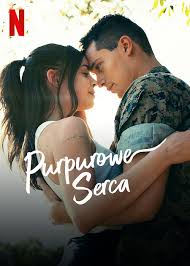
PURPLE HEARTS
US, 2022, 122 minutes, Colour.
Sofia Carson, Nicholas Galitzine, Chosen Jacobs, Linden Ashby, Anthony Ippolito.
Directed by Elizabeth Allen Rosenbaum.
Purple Hearts is a romance of the 2020s. It was particularly successful, large audiences, when the truth is released to streaming on Netflix.
What makes it distinctive is that the love story starts with quite some hostility, the romance between Luke, Nicholas Galitzine (Mary and George, Idea of You), from a military tradition family, letting loose, stealing and smashing cars, drug addiction, in debt, deciding to join the Marines but not telling his father, and Cassie, alienated from her mother, very independent, playing the piano and singing, composing songs, leading a successful group, suffering from type I diabetes.
Plenty of complications for the relationship.
While there has been overt hostility between Luke and Cassie, they come together with a plan, she having no insurance and incurring debt for her rent and diabetes medications, he having to pay back the thug from whom you borrowed the money. The plan is that they should marry, receive insurance benefits, he came back his loan. They marry, he goes off to war, there are communications, Cassie composing songs (with significant lyrics throughout the film, songs are true composed and sung by the star, Sofia Carson).
Action, an explosion, a friend killed, Luke’s leg injured, the return, his father discovering the truth, recuperation. And Cassie having more success with her group and songs and performance the Hollywood bowl.
Then, the arrest, the judgement, Luke exhilarating Cassie, is going to prison and the emitting their love for each other. And, something of an idyllic happy ending hopes for the future.
- Themes of the wall? Action? Heroism? Love?
- The California settings, the boot camp, apartments, musical beings, the Hollywood bowl…?
- The musical score, composed by Sofia Carson, performance? The lyrics echoing the themes?
- Cassie’s story, growing up, her relationship with the mother, her mother’s boyfriends? Rebelling against her mother? Her music, piano, composition, performance? Her friends in her band, The Loyal? Performances, response? Fans, agents, further opportunities? Significance of her diabetes, lack of money, no insurance, the medication and bills, not able to pay the rent, refusing help from her mother? The pharmacies, her pleas?
- Luke, his story, the marine tradition, his father, stern, letter of the law, his mother’s death, his brother, going to pieces, drugs, rebellion, taking his father’s car, smashing it, the loan to repay, joining the Marines, not telling his father? The training? His friendship with Frankie? Relationship with the other men? Going to the bar, the initial counter with Cassie? Hostility? The encounters with Johnny, the violent threats?
- The plane, tentative, the meetings between Luke and Cassie, the proposition, the marriage, the insurance, paying for the diabetes medication, and his money to pay off the debt? Against the law, the risks? The meetings, the agreement? Difficult in view of Cassie’s clashes with commando and the other men?
- The ceremony, Frankie, going to Cassie’s apartment, the night together, wanting to ignore it? Luke and his straight up-and-down attitudes? Cassie and her independence, female assertion, critiques of men? Luke having to move out, the farewell, keeping up appearances?
- The letters, the video links, Cassie and her compositions, playing for the men, their response? Luke, the interactions?
- Action, with the children, on parole, stepping on the mine, Frankie’s death, funeral, Riley and her grief, his parents, the rituals, Cassie giving Riley the ring?
- Luke, wounded, his leg, his career in running, hospital? Cassie, performance, success, phone call, her searching for Luke’s brothers number, going to the house, father and son having same name, the father’s reaction? Receiving the Purple Heart?
- Hospital, the revelation of the truth? The father, his reactions? Jake and his wife, the support? Is father offering to take Luke for rehabilitation twice a week?
- The return home, keeping up the appearances? Luke is trying to run? Cassie and her further success, the Hollywood bowl? The attack on Cassie’s mother’s house, John and his sending a message to Luke, Luke confronting him?
- Luke, the arrest, the case, Luke’s speech, accepting responsibility, exonerating Cassie? His going to prison, Cassie and her performance, driving fast, the family’s relief at her turning up, the farewell, admission of love?
- The aftermath, the two together, romantic, on the beach? The future?
- A story of initial hostility, friendship, gradual falling in love, mutual understanding?
Big Dog, The
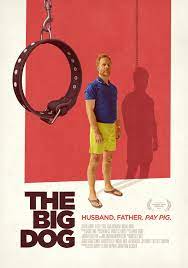
THE BIG DOG
Australia, 2023, 83 minutes, Colour.
Julian Garner, Felicity Price, Asher Boswarva, Michael Monk.
Directed by Dane McCusker.
The Big Dog is a brief Australian comedy with serious undertones and satiric overtones. The dog of the title lives next door to the family, continually barking throughout the film – and attempts to silence it, temporary permanently. And that is the climax to the film!
However, this is a story of Richard, Julian Garner, a middle-aged stockbroker who is not particularly successful at his work, is unsettled in his marriage, has a lazy son who is turning 18.
But, the key to the film is Richard and his going online with a dominatrix, Princess Paige, Asha Boswarva, platonic because always online, but some ludicrous interactions, his being humiliated, she relishing her power, especially in emptying his account which has serious consequences with his wanting to buy a lavish car for his son, revealing to his wife that the account is empty.
The action takes place over the one day, his wife, Felicity Price, trying to prepare a meal for the party and her husband not cooperating, her discovering the truth, and some resentment that she had not been able to pursue studies in the past, stifling her life as wife and mother. She discovers her husband’s behaviour as does her son who approaches the dominatrix and propositions her.
At the end, the dominatrix comes to the house, and the tone of the film seems to change to something of a dramatisation of a therapy session, Richard confronting his behaviour, his limitations, the consequences.
So, Richard is a blend of the serious and the ludicrous. The screenplay and direction are by first-time writer-director, Dane McCusker.
- The title, the presence of the dog, continued barking, and the attempts to get rid of it? The finale? Setting the tone of the film?
- The setting, the harbour mansions, the streets and views, interiors? The contrast with the scene for the dominatrix? The musical score?
- The tone of the film, the underlying serious themes, the satirical presentation of the characters and their behaviour, interactions?
- Richard’s story, age, long marriage, lazy son, taking after his father, tensions with his wife? Ability as a stockbroker – or not? A day in the life of…?
- Richard, the computer, online, the dominatrix, the tone of their interactions, platonic, humiliation, but the issue of money, Princess Paige and her control of his finances, emptying out his account? The consequences for him? Not having the money to buy the car he promised his son? Tensions with his wife, the preparation of the party, no invitations? The meal, cooking? His not concentrating? Phone call to his relative, the plea for the money, expectations of failure?
- Princess Paige, online, the dominatrix, her personality, commands – serious but the touch of the ludicrous? And Richard’s ludicrous responses? Seeing her in real life, the conversations with her roommate? Her work? Social work, political attitudes?
- Sam, in bed, dark room, lazy, his birthday, taking life for granted, interactions with his parents, the discovery of the link, the approach to Paige, the sexual approach and reaction?
- The day, getting worse for Richard, his wife discovering the truth, her response, interactions with Richard? With Sam? Her resentments about the marriage, Richard’s domination, her not being able to study and have a career?
- Paige and her arriving, her personality, less the dominatrix, more ordinary?
- The final part of the film, something of therapy session and style? The results?
- The finale and Richard and his wanting to get rid of the dog?
Pieces/ Australia
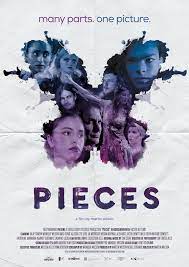
PIECES
Australia, 2022, 94 minutes, Colour
Monique Wilson, Alex Arco, Megan Aspinall, David Genat, Milu Green, Justin Hewitt, Jasmine Lucas, Katherine Marmion, Jasmine Lucas, John McIntosh, Dalip Sondhi, Ashanti Suriam, Allegra Teo..
Directed by Martin Wilson.
Pieces is a small budget feature film from Western Australia, featuring Perth, vistas of the city, but a focus on a centre for mental health and art therapy. The film was supported by HelpingMind and other organisations supporting mental health.
The film was written by Monique Wilson who takes the central role of a woman who runs the centre, with a grant, for art therapy for a range of people. There are five storylines within the framework. There is a depressed young woman and her supportive husband. There is a schizophrenic man who hears voices befriends a depressed girl. There is a young man, issues of sexual identity, keen on fashion, suicidal at times, clashes with his father. There is an older man, unsympathetic to mental illness and therapy, his wife with her troubles, disappearance, talent for dancing, and the young daughter. And, Alicia, the central character, has her own problems with her father and her mother’s suicide, and the angry outbursts and self-doubt of her daughter.
The situation of the film is the making of a documentary and a range of interviews with each of those at the centre, inappropriate questions, reactions, insightful questions.
The plotline moves to the various stories, intercutting them, the building up to a climax where there is damage to the centre but everybody banding together to build it up again, along with a dance music performance – and a melodramatic tragic event at the end.
The film to be recommended for those interested in therapy for those who have mental health difficulties, and the possibilities of art therapy.
- The background of mental health therapy? The film sponsored by HelpingMinds?
- The Perth setting, the vistas of the city, homes, workshops, the therapy centre? The musical score? The song, for dance?
- Alicia, her home story, relationship with her father, his later mental decline, relationship with her mother, her mother’s encouragement, sensitivity, suicide? Her own mental condition? Her daughter, the conflict with Violet, reconciliations, outbursts? The background of her divorce? Her committing herself to the therapy? Her philosophy of therapy, art, grounding people, their identity? Relationships with all those at the centre? And her own personal problems?
- Tom, the conflict with his father, outbursts, attempted suicide, his devotion to fashion, Alexander McQueen, styles, feathers, hair, clothes? His father, sympathetic, from feeling alienated? Their confrontations? Acceptance of his father, talking together, his father’s support? Bringing the power tools and helping in the cleanup? Tom and his talking with Violet, attempted suicides, support?
- Serge, schizophrenic, hearing voices, his artwork, personality, sympathetic? Outbursts? The friendship with Emerald, her background, attacked as being self-centred, the bonding with Serge? The discussions with Alicia?
- Cora and Lee, Cora and her depression, at home, discussions about pregnancy, ability and inability to care for a child? Lee, exasperation at home, coming to the centre, continued support of Cora?
- Raj, Indian background, his wife, daughter, his wife’s mental illness, disappearing, found naked, inability to care for her daughter, her love for her daughter, her ability for dancing? Raj, unsympathetic, the harsh comments, dismissing mental illness, dismissing soft therapies, wanting military service…?
- The work, the artwork, the mural, individual work, music, dance movement? The buildup to the final performance?
- The device of filming the documentary, Raj and his interventions, the range of questions, appropriate and inappropriate, the varying responses of all those interviewed?
- Violet, the clashes at home, the huge destruction at the centre, upending everything? Confession to her mother?
- The group coming together to put everything in order? The issue of grants, Alicia reluctant to tell others, the reactions? Final affirmation?
- The drama at the end, Raj, anger with his wife, Alicia and Violet, her father coming, the struggle, the shots, the father’s death?
- The film as a way of popular audiences having some kind of appreciation of mental illness, manifestations, consequences, care, therapy, affirmation, healing?
Kung Fu Panda 4
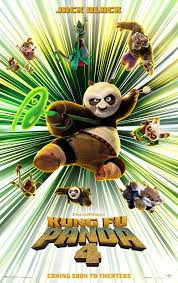
KUNG FU PANDA 4
US, 2024, 93 minutes, Colour.
Voices of: Jack Black, Awkwafina, Viola Davis, Dustin Hoffman, Bryan Cranston, James Hong, Ian McShane, Ke Huy Quan, Ronnie Chieng, Seth Rogen.
Directed by Mike Mitchell, Stephanie Stine.
It is already 16 years since we were introduced to the large Panda, Po, genial but not the brightest, working in his father’s noodle house, but becoming a chosen one, especially under the guidance of the Guru, Master Shifu, and destined to be the defender of his place and the assorted population, animals of every kind.
The animation is bright and colourful, the action, especially the martial arts combats, always lively. And the voices came from a large number of prominent Hollywood talent, starting with Jack Black enjoying himself as Po, with Dustin Hoffman voicing Master Shifu. There were the five champions of the region, there were villains. And there was combat, despite Po and his initial limitations.
Since his first film, there have been quite a number of short features with the his for Panda, more recently 42 episodes of a television series. And, for the theatres, there was one 2, Kung Fu Panda 3 now, eight years since the last movie, Kung Fu Panda 4.
Looking back over the synopses of the previous three films, we realise that the plot is virtually the same every time, Po, genial and awkward, taking his responsibilities seriously most of the time but often lackadaisical, confronting a variety of villains that turned up each time. And, it is much the same here. However, there is a challenge for Po, Master Shifu urging him to find and train a successor. But, Po enjoys his life and mission too much.
A lot of the previous villains are now in some kind of eternal dimension. So, here we have Chameleon and, shape shifting, absolutely sinister, power-hungry. In a variety of shapes and reverting back to her Chameleon shape, she is voiced by Viola Davis.
In the meantime, Po encounters the little Zhen, voiced by Awkafina, tantalising, quick in combat, continually challenging him.
Plenty of combat sequences, building up to Po versus Chameleon in an extended confrontation, the rising from their eternity of so many of the characters of the past, vanquished and imprisoned by Chameleon. And there is always the mischievous Zhen, freeing herself from the power of Chameleon – leading to who knows where, even a sequel!.
Po must be getting old because he does decide on his successor as he moves on to greater wisdom and responsibility (we hope!).
- The popularity of Kung Fu Panda? Films, television, the characters, the settings, colour, action? The musical score? The strong voice cast?
- The location, the Valley of Peace, the creatures, living in harmony, the noodle store, countryside, the mountains, the city by the sea and its interiors? Atmosphere?
- The same plot is the other films, the focus on Po, personality, size, weight, eating, martial arts skills, his role as defender? The combat sequences? His relationship with his 2 fathers?
- Master Shifu, his role of advice, the challenge to Po, wisdom, choosing a successor (and the comic sequence of the range of possible successors and their style)? His unwillingness?
- The 2 fathers, the store, the chatter, care for Po? The range of characters in the town? The opening, the creatures, the oppression, the enemy, the battle?
- The character of Zhen, small, cheeky, challenging, a skill with martial arts, the encounters with Po?
- The rising danger, Chameleon, her appearance, her voice, the shape shifting, becoming monstrous? Power hungry? Imprisoning the characters from the past and taking their power? Her power over is in? Zen and her rebellion? Siding with Po?
- The buildup to the confrontation, the elaborate battle, the shape shifting, the support of the older creatures, their past with Po, the support of him? The vanquishing of Chameleon? Master Shifu and his encouragement to fight?
- The future, accepting his destiny, the advice that he would know when he found his successor – and the challenge for Zhen?